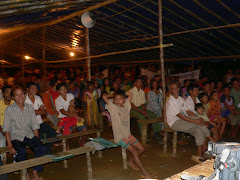Contract marriages a ticket out of a small town
The
SINGKAWANG, West Kalimantan (JP): With too much makeup for her tender years, Su Khim is about to embark on a momentous journey.
As a car pulled up in front of a three-star hotel in the center of Singkawang, she was one of the four people who alighted.
The others were two middle-aged men and a doltish looking young man.
They sat in the lobby, and the two older men began making a series of calls on their cellular phones. One of them came over to the young woman and told her: ""If the phone rings, you must answer yes.""
The man continued by telling her how she should answer the call in the Chinese dialect of
Su Khim is only one of thousands of ethnic Chinese young women from Singkawang who choose to marry men from
Economic woes are the greatest push for the amoy, as Singkawang's ethnic Chinese women were once known, to seek a foreign bridegroom. Unlike many other Chinese-Indonesian communities, Singkawang is relatively poor. Most of the people are vegetable farmers or fishermen.
Unmarried men from
Language is no handicap. Though Singkawang residents speak Hakka as theirvernacular dialect, they quickly become fluent in the dialect of
From hunger
Su Khim, who is from Karimunting village, Sungai Raya subdistrict, said she only finished the sixth grade of elementary school two years ago, whichwould make her about 15 years old.
She helped her parents in farming but they lived in poor conditions. One day a distant male relative came to her family and asked Su Khim if she would be interested in going to
It was not for a job offer, but to become the wife of a young man.
Su Khim did not find the offer strange because several girls from her neighboring village had married men from
She was told to have her photograph taken to be sent to
He was the younger man in the lobby. Although the man suffers from polio and is not particularly attractive, Su Khim said she was still willing to go through with the plan ""because he's still young"".
She will try out the marriage arrangement by staying in
Kenny Kumala of Singkawang's Ethnic Chinese Communication Forum (Foket) said the large number of Singkawang Chinese girls marrying men from
He said it was better today because the man was required to meet his prospective wife before the marriage day. ""In the past they didn't know whotheir husbands before they went to
Kenny did not deny the arrangement held risks for the women. ""I've received information from a non-governmental organization in Taiwan that there are 10,000 girls from Singkawang whose status is unclear.""
He also did not dispute that many girls also married good spouses.
""It is they who send money to their families in Singkawang each month,"" Kenny added.
Tjang Fo Hon, the head of a monastery in Singkawang, said men from Taiwanchose women from Singkawang as their wives because they were considered patient and not materialistic.
He said most of the men found it difficult to find partners in their own country, sometimes because of their looks but mostly because they were ""notestablished"".
Marriage to Singkawang women is a bargain for them. They only pay for their flights to Singkawang and a small dowry to their new in-laws. It's relatively inexpensive due to the strength of the Taiwan dollar to the rupiah.
The marriages are most often carried out at the public records' office. However, the men cannot bring their new wives to
""The process can take three months,"" Tjang Fo Hon added. If the applications are approved, the wives can follow their husbands.
In addition to send money back to their parents every month, the women usually return home for Chinese New Year.
Aloysius Kilim, regional legislature for Bengkawang regency, said there was no administrative way to prevent the marriages, despite protests that some of the women are underage.
""Anyhow their families become prosperous because their children have married in
For some women and their families, it's the only way for them to create abetter life. (Erma S. Ranik)





Tidak ada komentar:
Posting Komentar